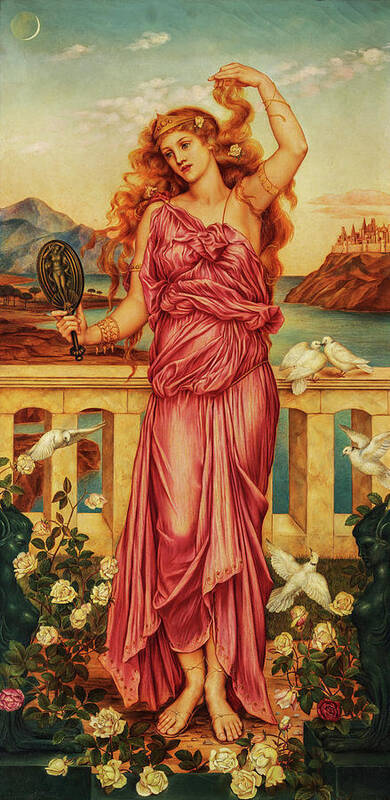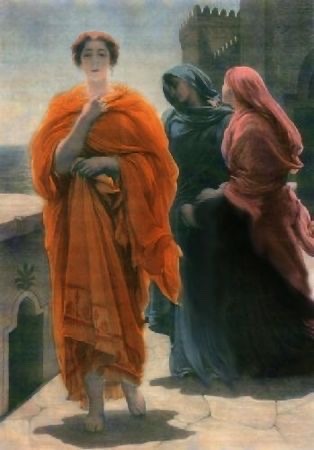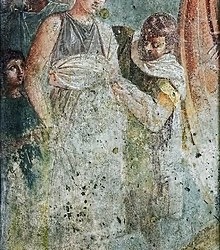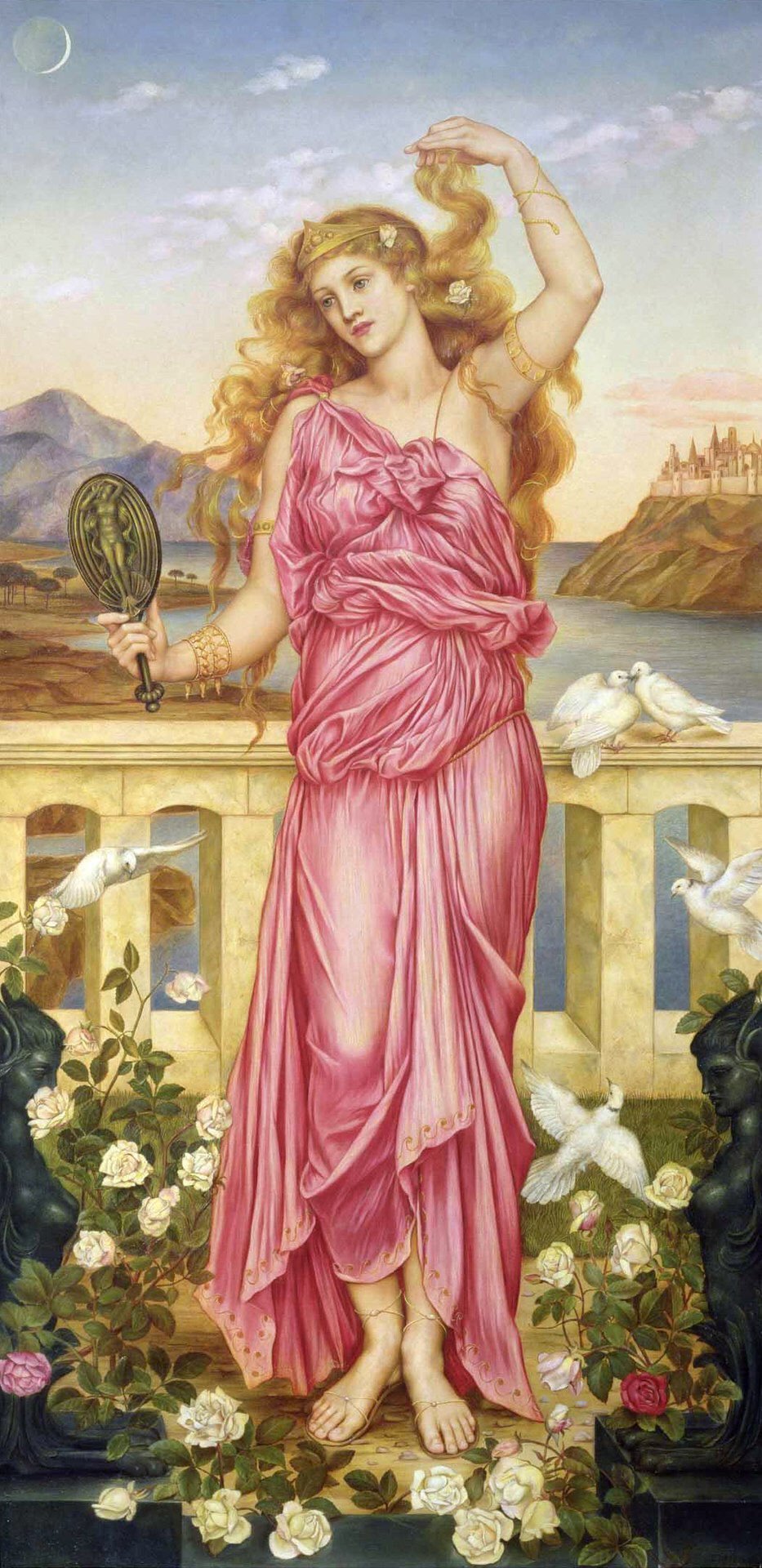#paris: ... the other daughter of zeus and leda?
Explore tagged Tumblr posts
Text
Paris in the locker room before the challenge quest: Er, so you don't, uh, mind?
Pollux: Mind what?
Paris: That I, uh, maybe sorta kinda ran away with your sister?
Castor: What sister.
#fate/grand order#fgo#fgo christmas#fan sketch#paris#the dioscuri#paris: ... the other daughter of zeus and leda?#castor: who the fuck is leda
5 notes
·
View notes
Text
Another commentary on Epic: The Musical, and their take on Helen. Cut songs depict her as a brainless beauty, and in The Horse and the Infant Odysseus tells Nestor to find and protect her... But in the myth they didn't need to find her, because she was in on the Horse and opened it to let the assault team out. She was one terrifying woman to anger, and one of two people in the entire Greek mythology to mess with Aphrodite and get away with it (for reference, ZEUS was scared of her due her ability to mess with the minds of everyone but Athena, Hestia, and Artemis, and even they were wary. The only god that messed with Aphrodite was Aephestus, and he got away with it because he had a point). So, how is the mythical Helen depicted? What kind of life did she have to knowingly help in the destruction of Troy and the massacre of the inhabitants?
It starts at birth, where she's the younger sister of the divine twins Castor and Pollux, and may or may not be actually the daughter of Zeus and Nemesis that hatched from an egg and was adopted by Leda, the queen of Sparta. And so beautiful that Theseus, known asshole, kidnapped her as a child to marry her later, only for his idiot friend Pirithous to drag him to try and kidnap PERSEPHONE (after years of torture, Theseus was allowed to leave, but Pirithous is still being tortured by Hades for trying to kidnap his wife), so when the brothers came to rescue her they found no opposition.
Back to Sparta, life continues, she knows that one day she'll get married off to a king like her older sister Clitemnestra (married to Agamemnon, king of Micene and overlord of Greece), when the unthinkable happened: Castor and Pollux, sons of Zeus and Leda, got themselves killed while raiding Messene, leaving Helen as the heir to the throne. Already so beautiful to launch a thousand ships, now there's the part where whoever marries her will become king of Sparta, and king Tyndarus is making HER choose. Thankfully Odysseus convinced the other suitors to swear to accept her choice and do everything to defend her marriage, allowing her to choose peacefully. And she chose her brother in law, Menelaus.
Soon after Tyndarus dies, so her new husband becomes king, and they have a daughter, Hermione. Sparta is a wealthy and powerful city, and Troy, the wealthiest city in the known world with many and powerful allies, sends an embassy with the newly rediscovered second prince Paris... Who got from Aphrodite the promise of the most beautiful woman in the world as wife, and decided to hold the goddess at the literal meaning of her promise, nevermind she was married, he was a guest (and Sacred Hospitality was the domain of Zeus himself), the husband loved her and needed her to be king, and that her brother in law was the one man capable of whipping the squabbling kings of Greece in a single army. Thus when Menelaus is away on business the goddess does her thing, and Paris brings her and the treasure to Troy.
Her arrival is celebrated by everyone except Cassandra, the prophetess cursed to not be believed, that predicts she'll cause the destruction of Troy if she's not given to Agamemnon's envoys. But seriously, Troy has mighty warriors, powerful allies including the demigod Aeneas, the Palladium to magically keep armies out, and magic walls built by Poseidon for the same effect, what could they do? Then a thousand ships carrying a hundred thousand warriors and multiple demigods start picking off Troy's allies one by one, and the Trojans blame HER. Most of them, king Priam, Paris and the crown prince Hector know who's actually to blame. And Paris gives her three sons and a daughter, only the sons die when their roof caves in on their heads.
Finally, after nine years of rampaging around the region, the Greeks show up with their full army and attack, and while Agamemnon's arrogance give the Trojans and the survivors of their allies divine help and a few days of upper hand, Agamemnon's situation is quickly solved and the Greeks' superiority carries the day, with Hector dying against Achilles after the Trojan army got routed. It only gets worse from there: Odysseus worked out how to disable Troy's magical defenses and already fulfilled most conditions, the relief force of Aethiops and Amazons is crushed and the survivors forced in the city, and while Paris managed to kill Achilles he meets his own end soon after, and the Trojans, rather than cut their losses, marry her off to Deiphobus, Hector and Paris' younger brother. And she doesn't think the Kheteioi (how the Odysseus calls the Hittites) will manage to do anything when they too come to rescue Troy. If she wants to get something good Helen has to take the situation in her own hands... And she wants to go back to her home in Sparta, the husband she choose, and their daughter.
A few days later, Odysseus and his partner in crime Diomedes sneak in to find the Palladium... Just as Helen expected, hence she was waiting for them so she could tell them where the thing was hidden. The two did the deed (Diomedes kept it, and would later give it to Aeneas' group of survivors after they met in Italy, where he had to go after pissing off Aphrodite got him and his army cucked and forgotten), and Odysseus warned her to be ready to help for his final trick.
After the Kheteioi arrived and got sent packing back to Hattusa, the Greeks start building something, and one morning they aren't there anymore, they have only left a giant wooden horse with wheels as a homage to Poseidon and a guy buried to the neck as a sacrifice, with the guy explaining that they finally gave up and went home with the loot from the other cities they sacked. Now, the right thing would be to carry the horse in the city... But the Trojans aren't stupid, it could be a trick. Not even Cassandra's curse as she tells them it's a trick manage to convince them it doesn't contain an assault team and carrying them in from the main gate would allow the Greeks to negate their last defense, but they can't just burn it unless they know for certain it's a trick or they'd anger Poseidon (many of them were alive when Priam's father did that and the god sent his take on Godzilla after them)... So Helen volunteers to check and starts imitating the voices of the wives of various Greek kings to get them to weep out of home sickness, while trying not to laugh because she knows Odysseus and others are inside. It works, so the horse is carried in, and everyone parties until they fall asleep.
Then Helen opens the horse and reunites with Menelaus, who was inside, and promptly brings him to Deiphobus, takes away the prince' sword, and then wakes him up to make him die in fear and the knowledge Troy is done for. In the meantime Odysseus opened the gates and recalled the fleet, so the Greeks are finally able to take Troy and massacre the inhabitants... And some blame HER for the mess and want to kill her, but she manages to convince them to let her go. The morning comes, Troy is sacked and destroyed, most Trojans are dead or enslaved and the few survivors are running for the hills, she's finally free to go home with her other daughter... Oh, wait, Hecuba, Priam's main wife, killed her to punish Helen.
Still, she's finally free to go, and since Menelaus was smart and pious he avoided the fall out from Ajax the Lesser breaking sanctuary by raping Cassandra on the altar of Athena's temple and the Greeks being unable to kill him because he had the audacity to claim sanctuary in the same temple (Zeus later got him for another act of idiocy). She gets more children, avoids being caught in the mess between her sister and father in law... And may have been still alive when the Heraclids sacked Greece and brought the Late Bronze Age collapse to her home.
16 notes
·
View notes
Text

Helen of Troy
Artist: Evelyn De Morgan (English, 1855–1919)
Date: 1898
Medium: Oil on canvas
Collection: De Morgan Centre, London, United Kingdom
Description
Helen of Troy was a figure in Greek mythology said to have been the most beautiful woman in the world. She was believed to have been the daughter of Zeus and Leda or Nemesis, and the sister of Clytemnestra, Castor, Pollux, Philonoe, Phoebe and Timandra. She was married to King Menelaus of Sparta "who became by her the father of Hermione, and, according to others, of Nicostratus also."Her abduction by Paris of Troy was the most immediate cause of the Trojan War.
#helen of troy#greek mythology#mythological painting#19th century art#evelyn de morgan#english painter#city of troy#doves#flowers#seascape#mountains#mirror#pink gown#roses#mythological character#pre raphaelite art#rosebush#painting#oil on canvas#fine art#oil painting#european art#english art#english culture
20 notes
·
View notes
Text
HELEN OF ‘TROY’ // PRINCESS OF SPARTA
“She was a figure in Greek mythology said to have been the most beautiful woman in the world. She was believed to have been the daughter of Zeus and Leda, and was the sister of Clytemnestra, Castor and Pollux, Philonoe, Phoebe and Timandra. She was married to King Menelaus of Sparta ‘who became by her the father of Hermione, and, according to others, of Nicostratus also’. Her abduction by Paris of Troy was the most immediate cause of the Trojan War. During the fall of Troy, she either betrays the Trojans or ‘tortured the men inside (including Odysseus and Menelaus) with the memory of their loved ones, and brought them to the brink of destruction’. After the deaths of Hector and Paris, Helen became the paramour of their younger brother, Deiphobus; but when the sack of Troy began, she hid her new husband's sword, and left him to the mercy of Menelaus and Odysseus. According to The Odyssey, she returned to Sparta, reconciled with Menelaus and led a harmonious married life.”


(left painting is ‘Helen on the Ramparts of Troy’ by Frederick Leighton)
4 notes
·
View notes
Text
Word Count Breakdown
Some of these have overlapping words because I copy paste around. Also a lot have small word counts because I tend to jot down snippets I separate into other docs later
Planning to write a Helen of Troy retelling where she gets into a love triangle with Eris, goddess of strife, and the prophet Cassandra, sister of Paris. It would also be heavily character focused, and delve into her relationship with her sister Clytemnestra. Basically it's all about the circumstances which lead to her making the choice to leave Sparta and kick off the Trojan war. A traditional Greek Tragedy with a sapphic twist.
Aphrodite: 15 words
Apple: 1064 words
Ariadne: 7 words
Artemis: 128 words
Bleeding: 376 words
Blood: 11 words
Cassandra: 9 words
Chariot: 205 words
Clytemnestra: 298 words
Daughter of Zeus MASTERDRAFT: 4983 words
Duties: 475 words
Egg: 1127 words
Eris: 684 words
Eris POV: 964 words
Leda: 13 words
Letter: 53 words
Night: 1163 words
String: 8 words
Swan: 247 words
Zeus: 2474 words
#greek tragedy#helen of sparta#helen of troy#greek mythology#greek mythology retellings#eris#the goddess eris#cassandra#the prophet cassandra#clytemnestra#eris greek mythology#eris goddess of discord#eris goddess of strife#cassandra greek mythology
3 notes
·
View notes
Text
in middle school during my Intense Greek Mythology Phase, Artemis was, as you can likely guess, my best girl. Iphigenia was my OTHER best girl. Yes at the same time.
The story of Iphigenia always gets to me when it's not presented as a story of Artemis being capricious and having arbitrary rules about where you can and can't hunt, but instead, making a point about war.
Artemis was, among other things--patron of hunting, wild places, the moon, singlehood--the protector of young girls. That's a really important aspect she was worshipped as: she protected girls and young women. But she was the one who demanded Agamemnon sacrifice his daughter in order for his fleet to be able to sail on for Troy.
There's no contradiction, though, when it's framed as, Artemis making Agamemnon face what he’s doing to the women and children of Troy. His children are not in danger. His son will not be thrown off the ramparts, his daughters will not be taken captive as sex slaves and dragged off to foreign lands, his wife will not have to watch her husband and brothers and children killed. Yet this is what he’s sailing off to Troy to inevitably do. That’s what happens in war. He’s going to go kill other people’s daughters; can he stand to do that to his own? As long as the answer is no—he can kill other people’s children, but not his own—he can’t sail off to war.
Which casts Artemis is a fascinating light, compared to the other gods of the Trojan War. The Trojan War is really a squabble of pride and insults within the Olympian family; Eris decided to cause problems on purpose, leaving Aphrodite smug and Hera and Athena snubbed, and all of this was kinda Zeus’s fault in the first place for not being able to keep it in his pants. And out of this fight mortal men were their game pieces and mortal cities their prizes in restoring their pride. And if hundreds of people die and hundred more lives are ruined, well, that’s what happens when gods fight. Mortals pay the price for gods’ whims and the gods move on in time and the mortals don’t and that’s how it is.
And women especially—Zeus wanted Leda, so he took her. Paris wanted Helen, so he took her. There’s a reason “the Trojan women” even since ancient times were the emblems of victims of a war they never wanted, never asked for, and never had a say in choosing, but was brought down on their heads anyway.
Artemis, in the way of gods, is still acting through human proxies. But it seems notable to me to cast her as the one god to look at the destruction the war is about to wreak on people, and challenge Agamemnon: are you ready to kill innocents? Kill children? Destroy families, leave grieving wives and mothers? Are you? Prove it.
It reminds me of that idea about nuclear codes, the concept of implanting the key in the heart of one of the Oval Office staffers who holds the briefcase, so the president would have to stab a man with a knife to get the key to launch the nukes. “That’s horrible!,” it’s said the response was. “If he had to do that, he might never press the button!” And it’s interesting to see Artemis offering Agamemnon the same choice. You want to burn Troy? Kill your own daughter first. Show me you understand what it means that you’re about to do.
#Electra was my other other best girl#I also stan Clytemnestra#love this murder family of women getting revenge in anguish for their loved ones they will never get back#tagamemnon#Greek Mythology#iphigenia#Trojan War#House of Atreus#long post
21K notes
·
View notes
Text
There is a new Hozier song from the upcoming album called Swan Upon Leda. Andrew discusses some of the impetus behind it, and how the news of Roe came through when they were mastering the song.
I thought it might be useful to talk through the references and allusions a bit. Also I'm never going to pass up a chance to word vomit on Greek mythology.
Leda is, of course, mother to two sets of twins: Helen of Troy and Clytemnestra, and Castor and Pollux; fathered by Zeus in the form of a swan. It's unclear if the union was consensual (Hozier seems to think it's not for the purposes of the song), because Zeus, but the through-line of women's/daughters' lives ruined or sacrificed for the ambitions of men is pretty clear.
Helen is kidnapped by Paris from her home in Sparta, and used as an excuse to start a war. (There's a whole mutual aid pact that figures into this and makes it messy as hell, but it's only tangentially relevant to this discussion.)
Clytemnestra's daughter Iphigenia is sacrificed by Agamemnon (Clytemnestra's husband and Iphigenia's father) to raise fair winds to Troy. The becalming is in retaliation for Agamemnon killing one of Artemis's sacred stags and his assertion he's a better hunter than the goddess of the hunt herself. So Agamemnon sends for his daughter, saying she will be married to Achilles. There are versions of the story where Agamemnon is horrified at this and is forced to go along with it by other leaders of the Greek army, including Menelaus (his own brother and Iphigenia's uncle), but regardless of intention, she is sacrificed. This sets off a whole chain of some of the messiest family drama in Greek mythology and I would say literature in general.
The most intriguing thing I learned from this Genius annotation is that the Republic of Ireland recognizes Palestine as a nation. It is very much in keeping with the Irish state's tradition of solidarity with other oppressed peoples around the world (the Choctaws and the Hopi/Navajo being one example). So tying Mona Eltahawy's work into all of this wraps a surprisngly neat bow around the whole thing.
It's a lot of information and allusion to stuff into a song that isn't very lyrically dense, and I feel like the music tries to take up the slack in a way that doesn't really work for me. The first time I listened to it I found the instrumentation overwhelming, to the point where I could barely make out the lyrics. And like. Andrew has a beautiful voice ("Cherry Wine" is probably the prettiest song about domestic violence you'll ever listen to), a fine instrument in intself. The only parts of the song that approach workable for me are the verses. You don't need the gaudy instrumentation to tell you this is a Story of Significance. Words and voice should be more than enough.
180 notes
·
View notes
Text
helen of troy (asteroid 101)
paid reading options: astrology menu & cartomancy menu
enjoy my work? help me continue creating by tipping on ko-fi or paypal. your support keeps the magic alive!

Helen of Troy was the twin of Clytemnestra, sister to the twins Castor and Pollux (sometimes referred to as Polydeuces), and daughter of Zeus and Leda (the swan myth) - the adoptive daughter of Tyndareus. In other myths, she is sometimes thought to be the daughter of Zeus and Nemesis (which is a less popular thought/myth), in this version Leda finds the egg (yes, she is still born from an egg in this one) and is then raised by Leda and Tyndareus. Helen is regarded in mythology as the most beautiful woman in the world. Originally, Helen was abducted by Theseus (who wanted a divine wife), and while he was adventuring his mother, Aethra guarded her. This was short lived because soon after Theseus left, the Spartans invaded Athens, leading this army were Helen's brothers, Castor and Pollux, who returned Helen home and took Aethra in return. In some myths, Helen had a child with Theseus named Iphigenia, who upon Helen's return to Sparta was given to her sister, Clytemnestra, and is later sacrificed to the gods in order to sail to Troy by Agamemnon (Clytemnestra's husband). Featured in The Odyssey, Helen is to pick a suitor from a hoard of great men due to Tyndareus's fear that they would start a war over her if she didn't choose (haha, foreshadowing). Before a suitor was chosen, Tyndareus received advice from Odysseus that all suitor should swear an oath to Helen's chosen husband to always support and fight against anyone who may fight him. When everyone agreed, she does pick Menelaus. Together her and Menelaus have a peaceful marriage in which she has four children with him and she happily takes her seat beside him on the throne of Sparta. This marriage in itself is marked as the end of the age of heroes. Helen was later abducted by Paris who was promised by Aphrodite that he would have the most beautiful woman in the world. Paris brought Helen to Troy - some myths state that the two eloped during this time (there was no abduction, it was by choice). And, of course, after this the Trojan War ensues. But what happened after the war to Helen of Troy (who should really be Helen of Sparta in my opinion)? Well there are three different endings. In one, she is brought back home to Sparta by Menelaus who is determined to kill her for being amorous with Paris - in this version, she undresses and Menelaus is shocked by her beauty and forgets to kill her. In another, she is exiled to Mount Olympus. And lastly (and most unlikely in my opinion), she goes to the Underworld to spend eternity with Achilles (like why would she lol?). IN MY OPINION Helena in your chart can represent a) where people may constantly fight over you, b) where you may be thought of as beautiful, and/or c) where you are excused for being disloyal.

i encourage you to look into the aspects of helena along with the sign, degree, and house placement. for the more advanced astrologers, take a look at the persona chart of helena AND/OR add the other characters involved to see how they support or impede helena!
OTHER RELATED ASTEROIDS: paris (3317), aphrodite (1388), achilles (588), zeus (5731 / h42), leda (38), tyndareus (8125), nemesis (128), aethra (132), iphigenia (112), agamemnon (911), odysseus (1143), ulysses (5254), and menelaus (1647)!
have ideas for new content? please use my “suggest a post topic” button!
return to nox’s guide to metaphysics
return to the masterlist of greek myths & legends
#asteroid astrology#astrology#astro chart#astro community#asteroid#astro placements#natal chart#persona chart#greek mythology#helena#helen of troy#asteroid101#achilles#asteroid588#agamemnon#asteroid911#aphrodite#asteroid1388#zeus#asteroid5731#paris#asteroid3317#the odyssey#odysseus#ulysses#asteroid1143#asteroid5254
117 notes
·
View notes
Text
Bts Greek Mythology
KIM SEOKJIN
Genre: Dionysus!Jin x Ariadne!Reader
Summary: As soon as he went down to the beach of Naxos, Jin was attracted by the convulsive cry of a woman. She saw a girl lying on the sand, crying and in despair, and the god came to her and began to console her, and saw the young woman’s face, and wiped her tears, and saw that she had never seen a woman so beautiful and so desperate; Then he begged the girl to tell him the reason for so much pain and she between cries and sighs began to tell.
COMING SOON...

MIN YOONGI
Genre: Hades!Yoongi x Persephone!Reader
Summery: Y/n is the daughter of Demeter, goddess of agriculture and Zeus father of the gods and god of heaven. One day as Y/n was picking flowers, the earth opened and from there came out a cart pulled by four black horses led by Yoongi, the god of hell born of Cronus and Rhea, brother of Zeus and Demeter. Yoongi fell in love so much that he kidnapped her and took her with him to the underworld
COMING SOON...

JUNG HOSEOK
Genre: Apollo!Hoseok x Daphne!Reader
Summery: The myth says that Hoseok, proud to have killed the snake Python with his arrows, boasted about it with Cupid, the god of love. In doing so, he mocked him, asking him what glorious feats he could boast of. Cupid, angry, swore vengeance to the god and prepared his arrows. The arrows that Cupid took with him to get his revenge on Apollo were two: one of gold, with the power to make those who received it fall in love; the other of lead, with the power to reject love.
COMING SOON...

KIM NAMJOON
Genre: Paris! Namjoon x Helen!Reader
Summery: Y/n of Troy, considered by all the most beautiful woman of the time, was the daughter of Zeus and Leda, sister of the Dioscuri and Clytemnestra. He married Seokjin, king of Sparta, son of Atreus and brother of the mighty Taehyung, king of Argos and Mycenae, husband of Clytemnestra. One day he came to Sparta, Namjoon, son of Priam king of Troy. Seokjin gave him hospitality. The young Namjoon, as soon as he saw his host’s wife, was struck by her beauty. Betraying her respect for hospitality, she convinced Y/n to flee with him, with the help of a potion given to her by the goddess of beauty Aphrodite.
COMING SOON...

PARK JIMIN
Genre: Eros!Jimin x Psiche!Reader
Summery: Y/n, a beautiful girl who cannot find a husband, becomes the attraction of all the neighboring peoples who offer sacrifices and call her Venus (or Aphrodite). The deity, knowing the existence of Y/n, jealous of the usurped name, sends her son Jimin to make her fall in love with the ugliest and miserly man on Earth and be covered by the shame of this relationship, But the god makes a mistake, and the arrow of love strikes his own foot, and he falls madly in love with the girl.
The Love i always Desired Pt. 1
The Love I Always Desired Pt. 2

KIM TAEHYUNG
Genre: Orpheus!Taehyung x Eurydice!Reader
Summery: The story tells of the love between Taehyung and Y/n, a married couple in love and happy. He was the son of the muse Calliope and the Thracian king Eagro. Y/n was a beautiful nymph amadriade. Their happiness lasted until young Aristaeus, a son of the god Apollo, fell madly in love with the woman. One day, in an attempt to escape Aristeo, she stumbled upon a poisonous serpent, which killed her by biting her. Taehyung dispersed terribly and, oblivious to fate, decided to go down to the underworld to go and take back his beloved
COMING SOON....

JEON JUNGKOOK
Genre: Ares!Jungkook x Aphrodite!Reader
Summery: Y/n was the goddess of beauty and sensual love. Born from the sea, her beauty was superior to that of any other creature. Whoever saw her, God or mortal, was enchanted by her beauty. Zeus to ensure that the beauty of Y/n did not provoke wars to Olympus, gave her in marriage to Namjoon, god of fire, forge, blacksmiths and craftsmen, was among those who loved Y/n in secret. But he was so clumsy and with a rougue looks. Then there was Jungkook, god of war, of violence, of virility and defender of the weakest. He was also the son of Hera and Zeus, but unlike Namjoon, he was good-looking. And he also had a penchant for goddesses and mortal women. He didn’t even bother to court them, he just made them his own. But when the god of war saw the goddess of beauty, he fell madly in love with her. Unlike what he used to do with other lovers, he began to court her. He filled her with gifts and adulations to win his love. The two spent a lot of time together and eventually Aphrodite gave in to her love.
COMING SOON...

#bts#bts greek#bts fanfic#bts greek gods#bts greek mythology#bts greek god au#bts greek gods!au#Bts greek god!au#greek god namjoon#god namjoon#greek god jin#god jin#god seokjin#greek god yoongi#god yoongi#greek god hoseok#greek god jhope#god hoseok#god jhope#greek god jimin#god jimin#greek god taehyung#god taehyung#greek god jungkook#god jungkook#bts fantasy au#bts fantasy!au#bts fanfiction#bts romance#bts smut
83 notes
·
View notes
Text




“Why, what could she have done, being what she is? Was there another Troy for her to burn?”
William Butler Yates
- & -
Helen or Helen of Troy was the daughter of Zeus and Leda in Greek mythology and she was considered to be the most beautiful woman in the known world.
Initially she was abducted by the hero Theseus, but was later rescued and returned home. A number of suitors vied for her hand in marriage, with eventually Menelaus being the victor. All suitors, though, were bound by an oath to assist, in case Helen would be abducted in the future. Her marriage to Menelaus, king of Sparta, saw her ascend to the throne of the city as a queen.
Paris, the Prince of Troy, was visiting Sparta for a wedding, however, Eris, the Goddess of Discord was not invited, angering her. To gain revenge she dropped a golden apple on which the words "To the fairest" were engraved. Hera, Athena and Aphrodite all claiming to be the fairest of all, demanded the apple. The decision was left to Paris who eventually chose Aphrodite, the prize being the most beautiful woman in the world.
Hence, Helen considered the most beautiful mortal woman was abducted by Paris and brought to Troy. However other accounts say that she went there by her own accord, and that she and Paris had eloped. When Menelaus realised what had happened, he asked all the suitors to help him bring his wife back, as they had sworn initially.
This is said to be how the Trojan War started.
Sourced from: https://www.greekmythology.com/Myths/Mortals/Helen/helen.html
#aesthetic#moodboard#collage#turquoise siren mythology series#turquoise siren edit#ancient greek aesthetic#greek myth#greek myth edit#greek myth aesthetic#greek pantheon#greek gods#greek goddesses#greek goddess#greek mythology#greek aesthetic#ancient greek#helen of troy#Helen of Troy aesthetic#trojan war
52 notes
·
View notes
Note
TW: talks of rape/sexual assault
Why is the story of Zeus raping Leda in the form of a swan so widely accepted? I know he definitely raped Nemesis (if you want to go that route), but Leda? I see many websites that talk about Helen's (and her sibling's) birth and use that narrative (even the miniseries Helen of Troy uses it), but when I look at the sources I don't see a whole lot. I only found two out of dozens that say Zeus 'violated' her or tricked her into sleeping with him:
Clement, Recognitions 10. 22 (trans. Smith) :
"Vile Transformatoins of Jupiter [Zeus] . . . Amongst those whom we have mentioned [of the adulteries of Zeus], he violated some being transformed, like a magician . . . Leda, the daughter of Thestius, being changed into a swan, of whom was born Helen; and again the same, being changed into a star, and of her were born Castor and Pollux."
And
Ovid, Heroides 17. 51 ff :
"[Helene to Paris :] ‘This house of mine is glorious enough with its own nobility . . . Leda makes Jove [Zeus] my father, deceived by the swan, false bird she cherished in her trusting bosom.’"
Is it that Leda honestly thought she was having sex with a swan and didn't know it was Zeus until later? I'm super confused. Why is this such a popular narrative when there's only two out of so many others?
Much like the way there's no actual way to know how (if any) sex happened between Zeus and Hera in connection to the cuckoo incident, because the only source we have for that doesn't mention it, but every modern source mentioning this screams HERA WAS RAPED AND FORCED TO MARRY ZEUS FOR THE SHAME.
It's Zeus, so "of course" it's rape (except no, not all the time. Maybe even not a lot of the time). It's a [mortal] woman having sex in Greek myth, so of course she's being forced, especially since it's with a god.
I'm not sure if Ovid can be read either way, or if he did mean it as sexual assault. But I could see that "false" be because Zeus isn't actually a bird, of course (and like, good thing!), and not that Leda is being tricked in some manner. Clement is a Christian writer, of course he'd turn this into rape.
The closest I could get to what maybe is describing the sex between Zeus and Leda, though specifically about Kastor and Poludeukes, is the Homeric Hymn 17 to the two of them: "when the dark-clouded Son of Cronos had privily bent her to his will."
But, if I understand that word (the "bent her to his will" bit) right I don't think it would necessarily mean force, or assault. It's also, for example, used of Orthos (you know, a monstrous dog) having sex with Chimera, and I don't think we'd bother to describe sex between monstrous animals as assault, yes?
14 notes
·
View notes
Text
Helen of Troy, also known as beautiful Helen, Helen of Argos, or Helen of Sparta, was said to have been the most beautiful woman in the world. She was the daughter of Zeus and Leda, and was the sister of Clytemnestra, Castor and Pollux. She was married to King Menelaus of Sparta.
“Some say a host of horsemen, others of infantry and others
of ships, is the most beautiful thing on the dark earth
but I say, it is what you love
[…] for she that far surpassed all mortals in beauty, Helen her
most noble husband”
— Sappho, fragment 16
Guido Reni

Although Helen is sometimes depicted as being raped by Paris, Ancient Greek sources are often elliptical and contradictory.
The Abduction of Helen, painting by Girolamo Genga, circa 1510 (Musée des Beaux-Arts de Strasbourg).

The Rape of Helen by Francesco Primaticcio (c. 1530–1539, Bowes Museum) is representative of this tradition.

The Rape of Helen by Tintoretto (1578–1579, Museo del Prado, Madrid); Helen languishes in the corner of a land-sea battle scene.

Helen on the Ramparts of Troy was a popular theme in the late 19th-century art – seen here a depiction by Frederick Leighton.

Gustave Moreau depicts an expressionless Helen; a blank or anguished face.

Maarten van Heemskerck, Helen abducted by Paris, The Walters Art Museum.

The Love of Helen and Paris by Jacques-Louis David (oil on canvas, 1788, Louvre, Paris)

Zeuxis et les Filles de Crotone (François-André Vincent, 1789, Louvre). The painter Zeuxis was commissioned to produce a picture of Helen for the temple of Hera at Agrigentum, Sicily. To realize his task, Zeuxis chose the five most beautiful maidens in the region.

Helen of Troy by Evelyn De Morgan (1898, London)

#Gustave Moreau#Helen#greek mythology#art history#Woman#Sappho#Girolamo Genga#Francesco Primaticcio#Tintoretto#Frederick Leighton#Art history#Maarten van Heemskerck#Jacques-Louis David#François-André Vincent#Evelyn De Morgan#helen of troy
22 notes
·
View notes
Photo

François-Édouard Picot - Léda - 1832
Leda and the Swan is a story and subject in art from Greek mythology in which the god Zeus, in the form of a swan, seduces or rapes Leda. According to later Greek mythology, Leda bore Helen and Polydeuces, children of Zeus, while at the same time bearing Castor and Clytemnestra, children of her husband Tyndareus, the King of Sparta. In the W. B. Yeats version, it is subtly suggested that Clytemnestra, although being the daughter of Tyndareus, has somehow been traumatized by what the swan has done to her mother. According to many versions of the story, Zeus took the form of a swan and raped Leda on the same night she slept with her husband King Tyndareus. In some versions, she laid two eggs from which the children hatched. In other versions, Helen is a daughter of Nemesis, the goddess who personified the disaster that awaited those suffering from the pride of Hubris.
The subject was rarely seen in the large-scale sculpture of antiquity, although a representation of Leda in sculpture has been attributed in modern times to Timotheus ; small-scale sculptures survive showing both reclining and standing poses, in cameos and engraved gems, rings, and terracotta oil lamps. Thanks to the literary renditions of Ovid and Fulgentius it was a well-known myth through the Middle Ages, but emerged more prominently as a classicizing theme, with erotic overtones, in the Italian Renaissance.
François-Édouard Picot (French: [piko]; 10 October 1786 in Paris – 15 March 1868 in Paris) was a French painter during the July Monarchy, painting mythological, religious and historical subjects.
56 notes
·
View notes
Text
* helen: the destroyer.
basic ass profile series.

portrayal notes.
Cypria fragment-based origin: Daughter of Nemesis and Zeus, not Zeus and Leda. Adopted by Tyndareos and Leda.
Pulls from myth canon and blog headcanon; Greek myth based & Mexican culture influenced.
Portrayal heavily involves trauma/C-PTSD and its aftereffects (NOT exploitive) as well as casual depictions of drug use.
Interested in exploring the intersection of how Helen wants to be seen vs how she is treated (subject vs object); personhood vs divinity.
Primary, Epic Cycle. Verses include (but not limited to) myth canon, myth AU, apotheosized/goddess, and modern.

basics.
Helen of Sparta Troy Sparta Queen of Sparta, Princess of Troy Spartan / Laconian / Aegan —of Indigenous Mexican heritage in non myth verses Epic Cycle
appearance.
Helen’s beauty is sublime—something more welcome and accepted among the gods than the common folk she walks among. Breath-taking, captivating. A beauty so intense that it makes those around her uncomfortable.
Her beauty is the type to inspire comparisons to the landscape.
Looks different enough from her siblings to give her a complex over not belonging: her brown hair shines golden in the sunlight, her freckles glisten, her eyes are the same blue of the Spartan sky.
non-mythic Helen has golden brown eyes.
relationships.
Divine Parents: Zeus & Nemesis Adopted Parents: Tyndareos & Leda Tyndareides: ��Timandra, Philonoe, Phoebe, Castor, Pollux, and Klytaimestra. Spouse: Menelaos, Paris, Deiphobos, & Menelaos again. Children: Iphigenia, Hermione, [ and a couple of sons ] Connections: Theseus, Phaedra, Artemis, Aphrodite, Agamemnon, Achilles, Patroclus, Kassandra, Hekabe, etc. etc. etc.
personality.
Helen is haunted over what happened during her youth in Athens. Though surface-friendly and magnanimous, she distrusts pretty much everyone she meets and generally takes a long time to warm up to others.
Jealous and possessive over that which she considers to be “hers”, even if it’s not something (someone) she wants/likes/loves.
Has a complex over the state of her divinity and her desire to be seen as and loved as a person as opposed to coveted for her beauty and divinity.
need to know.
Helen left Sparta with Paris willingly.
Has C-PTSD from being kidnapped by Theseus and held captive for over a year.
Has a couple of “Laconian hounds” as emotional support/service animals. They are specifically shepherd-bred and large breed herding dogs that are the predecessors of the modern Greek Shepherd.
Considered a religious/divine figure in Sparta since her birth, which is why she was never going to be married out as it was believed her presence would ensure Sparta’s continued glory.
Takes drugs recreationally and medicinally, in both mythic and other verses.

6 notes
·
View notes
Text
Helen of Sparta, the first femme fatale

From Greek Mythology
I. BASIC STATS
i. OTHER NAMES: Helen of Troy (known as; doesn’t answer to it); Helena ii. MAIN PERIOD: Circa 13 000 BC iii. PLACE OF RESIDENCE: Sparta, Greece. In threads, Helen’s motherland may be referred to by other names such as Lacedaemon (the city-state), Laconia (the region) or, less frequently, Peloponnese (the peninsula). Helen has also resided in Troy (also called Illium) and briefly in Aphidnae for a time in her youth. iv. OCCUPATION(s): Queen of Sparta (heir); priestess, seer v. RELIGION: Hellenic polytheist vi. TERMS OF ADDRESS: “my queen” vii. MUSE LEVEL: Main muse viii. CONNECTIONS: Leda (mother); Hermione (daughter); Zeus (father); Tyndareus (adoptive father); Menelaus (husband); Paris (husband); Deiphobus (husband); Castor and Pollux (twin brothers), Clytemnestra (sister) & more.
II. PERSONALITY
LIKE ANY OTHER SPARTAN, Helen is succinct, self-disciplined and loyal to the motherland its laws. She is austere, determined and arrogant, but seductive despite that. Her posture is always mighty and regal. She speaks with authority and confidence, demands rather than asks, expresses dominance through her body language – haughty and open-chested – and has a tendency to invade other people’s personal spaces by touching them or their personal items.
Helen values strength, loyalty, cleverness and endurance, to the same extent that she despises its opposites.
III. MUSE-SPECIFIC POTENTIAL TRIGGERS
There may be mentions of rape, but no graphic scenes depicting it. Graphic violence can often occur and, considering the character’s cultural background, Helen might have a desensitized point of view when experiencing, witnessing or causing it. Infidelity, unhealthy mother-daughter relationships, animal sacrifices, consumption of alcohol and natural hallucinogens will come up occasionally.
IV. SKILLS AND ABILITIES
Spiritual powers associated with Aphrodite’s domains, such as: beauty (the power to give it or take it away), fertility (the power enable conception for people who have trouble procreating, or to take away that ability from those who had it; the power to turn barren land into fertile soil or the other way around), sexuality (the power to provoke sexual desire; the power to cure sexual impotence or inflict someone with it) and love (the power to imitate traits of people that the target loves; voices, appearance, mannerisms).
The abilities of a seer, such as to read bird-signs, combined with a deepened perception about the ministrations of the Gods upon their lives, as well as an accurate assessment of human fate through clairvoyance.
An extreme capacity for recognition that enables her to see through disguises and tricks, even when they come from the gods.
Mortal abilities include wrestling, hunting, music, javelin-throwing, negotiation, strategic thinking, social intelligence, leadership, extreme physical endurance, dancing and horse riding.
V. INTERPRETATIONS/CANON DIVERGENT POINTS
There is no real canon to Greek Mythology, so instead I’ll just say that this Helen is the opposite of how you may have seen her on modern media. My Helen is not an oppressed and unwilling wife to Menelaus – quite the contrary. She did not choose to leave Sparta on a whim – it was her fate. Although there were people on the Trojan side that she did come to care about, Helen was always #TeamGreeks because that’s where the Spartans were fighting and she will never side against Sparta.
VI. MUSE-SPECIFIC GUIDELINES
ONE. Writing about your muse’s perception about Helen with lines like, “she did not look godborn” or “her famed beauty was not all that much” kind of defeats the purpose of Helen. It’s the same as if I would take the most conspicuous and defining trait of your character and deny that through my muses point of view. Please don’t. TWO. Helen is a character that naturally flirts and uses sexuality as a weapon. Think of her as Aphrodite’s half-mortal surrogate. When it occurs, don’t interpret that as an attempt from me to guide the thread towards smut or romance if we haven’t discussed this possibility ooc. It’s a character trait.
VII. INTERACTIONS & BUILDING RELATIONSHIPS
Helen is a queen before she is a friend. She evaluates other people through the eyes of a ruler, dividing them between allies and rivals. Her priority is always her duty and she is willing to sacrifice personal relationships in order to achieve her goals. This is not going to change for your character, I should say in advance. On the other hand, if she has your loyalty, you will have hers. Like Zeus, Helen is ruthless, but just.
Possible dynamics include, but are not limited to: muses with political/financial/military powers establishing an alliance or partnership with Helen; muses with good fighting skills in her employment; muses seeking assistance through Helen’s spiritual powers, blood feuds, Helen being captive to your muse or the other way around, our muses at opposing sides of a war or conducting it as allies, etcetera.
VIII. SHIPPING
Because she is a pragmatist and a stoic, it’s rather unlikely to place Helen in a kind of “love conquers all” kind of ship. On the other hand, she easily has chemistry with most characters. Relationships tend to be passionate and carnal, but casual and with little to no emotional attachment. She is attracted to physical prowess.
Meaningful relationships are possible but harder to build. The ideal profile for Helen is someone who is strong, gritty and thrilling, but though she is attracted to dominance, she will end up being the most dominant one or else the relationship will hardly work. In any case, Helen is not monogamous and she will not change for any muse.
Possible dynamics include, but are not limited to: arranged marriages, extramarital affairs, enemies to lovers, etcetera.
IX. TAGS
General tag. Answered asks. Threads. Visage. Musings. Tunes.
1 note
·
View note
Text
SING TO ME MUSE OF FAIR-TRESSED HELEN, a woman turned to witchcraft, a princess sculpted into a deity. what do you know of fear, fair helen, you are it’s harbinger, you who catalysed a war, whose face could launch a thousand ships, a glance from whom leaves men feeling weak and alone. you who is more sculpture than woman, just as the aphrodite of knidos, sculpted years after your story, you are something to be admired and not touched. and yet fear has known the daughter of leda, his claws have snatched at her heart one too many time; found within the schemes of paris, stolen away from a maritial bed, later at the death of her brother’s and compatriots, watching those she loved fall yet also the lingering worry as to what will happen if they win, and finally at the taste of steel to her throat, a former husbands eyes awash with rage. she has known fear perhaps more than any man and from it a deity, a witch has been born. at the other’s words golden orbs narrow and the daughter of zeus take on a certain air of her father, a tone of hubris flooding her limbs. “ who is there for me to fear? men fear me, women tremble at the though i shall come near. my very face is a weapon, and a drop of my potions could steal the life from a man in a single breathe -------- none but the gods hold anything over me. ” not anymore. words left unspoken, stolen by the wind. you, laughter-loving helen, have made yourself a fortress, more vengeful than ares, more dangerous than laughter-loving aphrodite.
@treppenwitzz sent : “ you grant them greater power if you fear them. ” from magda to helen.
#* interaction : helen of sparta .#kidnap tw#idk when this is set but hope it's okay <333#i kind of just imagine her as immortal#the fame of her beauty has deified her
2 notes
·
View notes